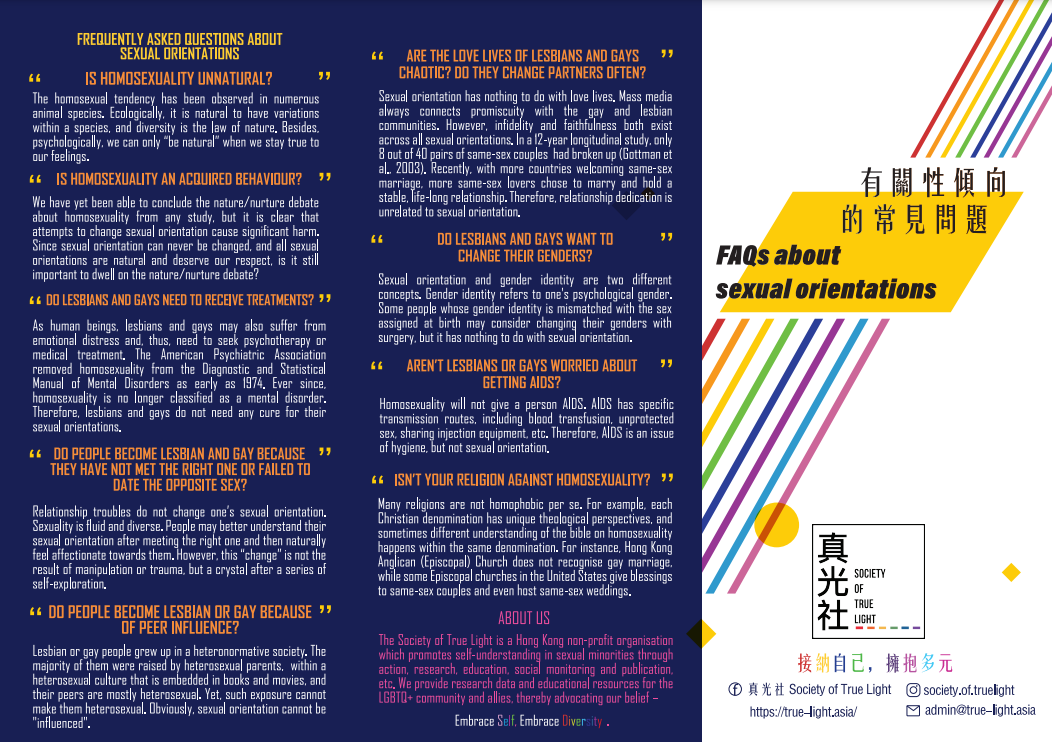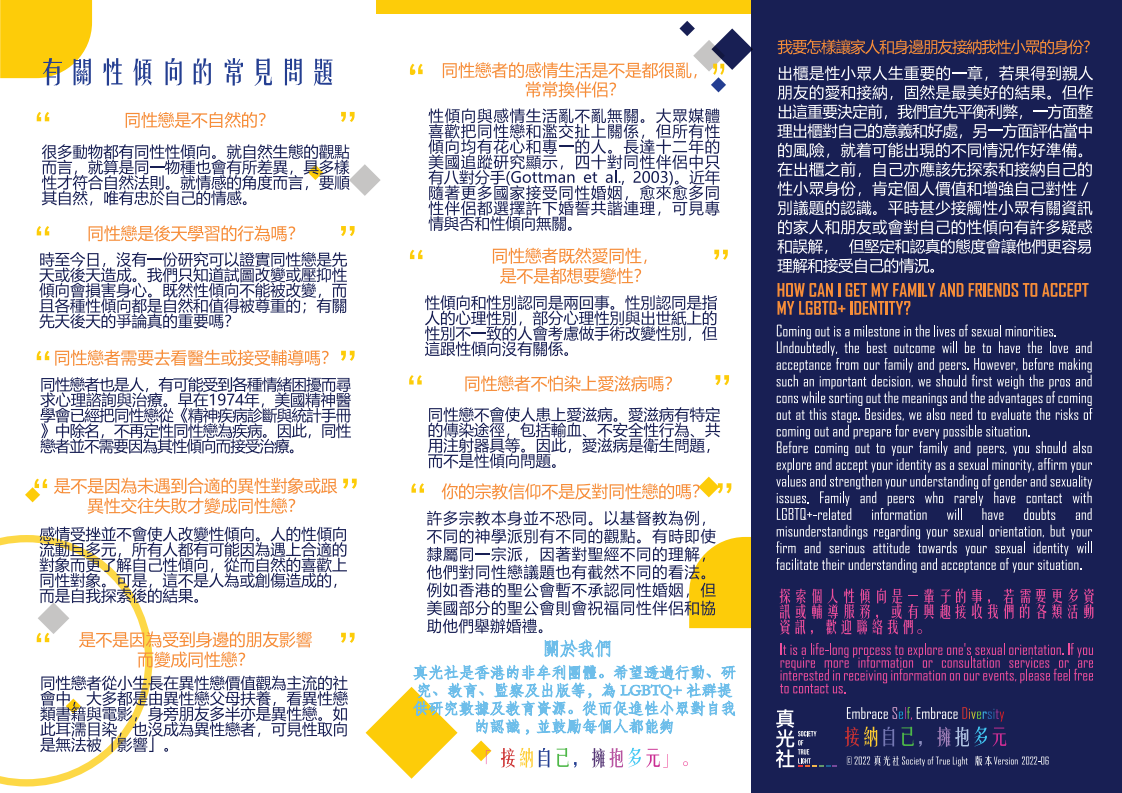有關性傾向的常見問題
FAQs About Sexual Orientations
1
同性戀是不自然的?
Is Homosexuality Unnatural?
很多動物都有同性性傾向。就自然生態的觀點而言,
The homosexual tendency has been observed in numerous animal species. Ecologically, it is natual to have variations within a species, and diversity is the law of nature. Besides, psychologically, we can only “be natural” when we stay true to our feelings.
2
同性戀是後天學習的行為嗎?
Is Homosexuality an Acquired Behaviour?
時至今日,沒有一份研究可以證實同性戀是先天或後天造成。
We have yet been able to conclude the nature/nurture debate about homosexuality from any study, but it is clear that attempts to change sexual orientation can never be changed, and all sexual orientations are natural and deserve our respect, is it still important to dwell on the nature/nurture debate?
3
同性戀者需要去看醫生或接受輔導嗎?
Do Lesbians and Gays Need to Receive Treatments?
同性戀者也是人,有可能受到各種情緒困擾而尋求心理諮詢與治療。
As human beings, lesbians and gays may also suffer from emotional distress and, thus, need to seek psychotherapy or medical treatment. The American Psychiatric Association removed homosexuality from the Diagnostic and Statistical Manual of Mental Disorders as early as 1974. Ever since, homosexuality is no longer classified as a mental disorder. Therefore, lesbians and gays do not need any cure for their sexual orientations.
4
是不是因為未遇到合適的異性對象或跟異性交往失敗才變成同性戀?
Do People Become Lesbian and Gay Because They Have Not Met the Right One or Failed to Date the Opposite Sex?
感情受挫並不會使人改變性傾向。人的性傾向流動且多元,
Relationship troubles do not change one’s sexual orientation. Sexuality is fluid and diverse. People may better understand their sexual orientation after meeting the right one and then naturally feel affectionate towards them. However, this “change” is not the result of manipulation or trauma, but a crystal after a series of self-exploration.
5
是不是因為受到身邊的朋友影響而變成同性戀?
Do People Become Lesbian or Gay Because of Peer Influrence?
同性戀者從小生長在異性戀價值觀為主流的社會中,
Lesbian or gay people grew up in a heteronormative society. The majority of them were raised by heterosexual parents, within a heterosexual culture that is embedded in books and movies, and their peers are mostly heterosexual. Yet, such exposure cannot make them heterosexual. Obviously, sexual orientation cannot be “influenced”.
6
同性戀者的感情生活是不是都很亂,常常換伴侶?
Are the Love Lives of Lesbians and Gays Chaotic? Do They Change Partners Often?
性傾向與感情生活亂不亂無關。
Sexual orientation has nothing to do with love lives. Mass media always connects promiscuity with the gay and lesbian communities. However, infidelity and faithfulness both exist across all sexual orientations. In a 12-year longitudinal study, only 8 out of 40 pairs of same-sex lovers chose to marry and hold a stable, life-long relationship. Therefore, relationship dedication is unrelated to sexual orientation.
7
同性戀者既然愛同性,是不是都想要變性?
Do Lesbians and Gays Want to Change Their Genders?
性傾向和性別認同是兩回事。性別認同是指人的心理性別,
Sexual Orientation and gender identity are two different concepts. Gender identity refers to one’s psychological gender. Some people whose gender identity is mismatched with the sex assigned at birth may consider changing their genders with surgery, but it has nothing to do with sexual orientation.
8
同性戀者不怕染上愛滋病嗎?
Aren't Lesbians or Gays Worried About Getting AIDS?
同性戀不會使人患上愛滋病。愛滋病有特定的傳染途徑,包括輸血、
Homosexuality will not give a person AIDS. AIDS has specific transmission routes, including blood transfusion, unprotected sex, sharing injection equipment, etc. Therefore, AIDS is an issue of hygiene, but not sexual orientation.
9
你的宗教信仰不是反對同性戀的嗎?
Isn't Your Religion Against Homosexuality?
許多宗教本身並不恐同。以基督教為例,
Many religions are not homophobic per se. For example, each Christian denomination has unique theological perspectives, and sometimes different understanding of the bible on homosexuality happens within the same denomination. For instance, Hong Kong Anglican (Episcopal) Church does not recognise gay marriage, while some Episcopal churches in the United States give blessings to same-sex couples and even host same-sex weddings.
我怎樣才能讓我的家人和身邊朋友接納我性小眾的身份?
How Can I Get My Family and Friends to Accept My LGBTQ+ Identity?
出櫃是性小眾人生重要的一章,若果得到親人朋友的愛和接納,
但作出這重要決定前,我們宜先平衡利弊,
在出櫃之前,自己亦應該先探索和接納自己的性小眾身份,
Coming out is a milestone in the lives of sexual minorities.
Undoubtedly, the best outcome will be to have the love and acceptance from our family and peers. However, before making such an important decision, we should first weigh the pros and cons while sorting out the meanings and the advantages of coming out at this stage. Besides, we also need to evaluate the risks of coming out and prepare for every possible situation.
Before coming out to your family and peers, you should also explore and accept your identity as a sexual minority, affirm your values and strengthen your understanding of gender and sexuality issues. Family and peers who rarely have doubts and misunderstandings regarding your sexual identity will facilitate their understanding and acceptance of your situation.


